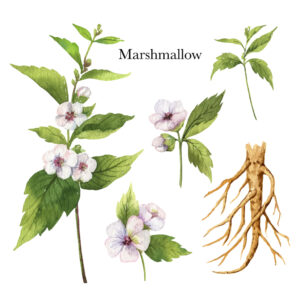
Overview of Marshmallow Root (Althaea officinalis L.)
Marshmallow root is a herb that has been used for centuries in traditional medicine. It is native to Europe, Asia, and North America and grows best in wet soil. The plant’s leaves are edible but it is the root that contains the most medicinal properties. It is high in vitamins A, B6, C, and E as well as minerals like calcium, potassium, magnesium, and zinc. So lets talk about the medicinal properties of Marshmallow root.
Medicinal Properties of Marshmallow Root
Marshmallow root has a range of health benefits due to its rich nutrient content. It is thought to reduce inflammation and swelling, relieve coughs and congestion, help manage diabetes, protect against ulcers, aid digestion, and even treat skin conditions like eczema.
Marshmallow root contains high levels of mucilage, which is a thick, slimy substance that coats the throat and digestive tract, providing protection against irritation. It also has antioxidant and antimicrobial properties which may help fight off infection and reduce inflammation. One study found it healed wounds infected with gram-positive bacteria better than the antibiotic control group of rats. Additionally, marshmallow root may be beneficial in treating respiratory conditions such as bronchitis.
See my article on home remedies for coughs here.
Marshmallow root is generally considered safe for most people when taken in appropriate doses. The typical recommended dose is 2-3 grams per day, though higher doses may be used for specific conditions. Always consult your doctor before taking marshmallow root to ensure it’s right for you.
Marshmallow root is available in a variety of forms including supplements, powders, teas, tinctures, and capsules. It is important to check with a healthcare professional before taking any supplements or consuming marshmallow root in large amounts. Marshmallow root should not be used by pregnant women, breastfeeding mothers, or people with pre-existing medical conditions without first consulting a healthcare provider.
Potential Risk of Marshmallow Root
Marshmallow root is generally considered safe when taken in appropriate doses. However, it can cause mild side effects such as nausea, diarrhea, or stomach pain. In rare cases, it may also cause an allergic reaction with symptoms such as rash, itching, swelling of the face or throat, dizziness, difficulty breathing, and chest tightness.
Marshmallow root may interact with other medications, so it is important to speak with a healthcare professional before taking any supplements or consuming marshmallow root in large amounts.
Due to its potential side effects, it is generally advised that people consult a healthcare provider before using marshmallow
Tips on Using Marshmallow Root
How to use marshmallow root in cooking, teas, and other recipes will vary, but here are a few general tips:
• Make sure to buy marshmallow root from a reputable source. Quality is important when it comes to herbal supplements and remedies.
• Start with the lowest dose of marshmallow root and gradually increase it as needed. This may help decrease GI distress side =effects such as nausea and diarrhea.
• Avoid taking more than the recommended dosage as this could lead to adverse side effects.
• If taking marshmallow root in powder form, mix it with water or other liquids to help dissolve the powder and make it easier to digest.
• Consult a healthcare professional before using marshmallow root if pregnant or breastfeeding, have an existing medical condition, or are taking any medications.
How to Incorporate marshmallow root into your diet
Marshmallow root can be used in various ways, including:
• Adding it to teas or other hot beverages.
• Mixing it into oatmeal or yogurt for a nutritional boost.
• Adding it to smoothies and shakes.
• Making marshmallow root tinctures with alcohol or vinegar for easy consumption.
• Adding it to soups and sauces for a flavorful boost.
• Including it in recipes for breads, cookies, muffins, and other baked goods.
Marshmallow taste can be described as slightly sweet with a mild flavor, making it an excellent addition to many recipes.
This article belongs to pineyriverhomestead.com published 7-22-23
Where to Buy
Marshmallow root is readily available from many health food stores, online retailers, and herbal supplement suppliers. When looking to purchase marshmallow root products, it is important to look for a supplier that has a good reputation for providing quality products and offers transparency about the source of their ingredients.
Many reputable brands now offer marshmallow root supplements in capsule, powder, and extract forms. These can be taken as a supplement to improve digestive health or as part of an overall health-promoting diet. Marshmallow root can also be added directly into recipes for food items such as breads, muffins, cookies, and soups. This article belong to pineyriverhomestead.com published 7-22-23.
Conclusion
Overall, marshmallow root is a safe and natural remedy with a wide array of potential health benefits. It is important to consult with a healthcare professional before taking this herbal remedy, especially if pregnant or breastfeeding, have an existing medical condition, or are taking any medications. Once approved by your healthcare provider, marshmallow root can be easily incorporated into your diet for an extra boost of nutrition and potential health benefits.
Note: This content is for informational purposes only and should not be considered medical advice. As always, consult with your healthcare provider before making any changes to your diet or medications including herbs.
For information on other herbs and their medicinal qualities check here.
Happy eating!
Resources
https://www.healthline.com/health/food-nutrition/marshmallow-root

